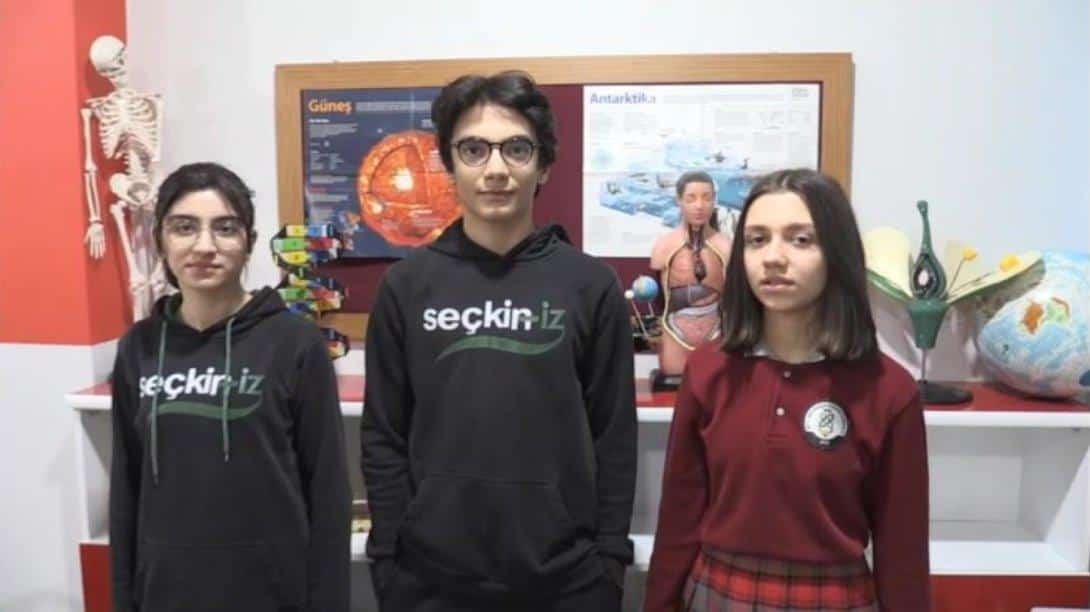BİLSEM STUDENTS' EXPERIMENT TO BE RESEARCH SUBJECT IN SPACE
Turkey's first astronaut, Alper Gezeravcı, will conduct 13 different scientific experiments prepared by universities and research institutions during his 14-day stay at the International Space Station (ISS). As part of this, the PRANET experiment prepared by Muş Science and Art Center students will investigate the effect of propolis on bacteria in microgravity.
Information about the scientific experiments planned for Turkey's first manned space mission was shared by the Ministry of Industry and Technology. The announcement stated that a call for experiments had been made, and the responses to this call were evaluated by a commission consisting of experts from the Turkish Space Agency (TUA) and TÜBİTAK Space.
The announcement provided the following information about the experiments to be conducted by Turkey's first astronaut, Gezeravcı: The UYNA experiment developed by TÜBİTAK Marmara Research Center (MAM) aims to produce high-temperature-resistant, high-strength alloys using the ELF in the KIBO module. The study will investigate the effects of microgravity on properties such as thermophysical and crystal growth during melting and solidification processes, aiming to contribute significantly to Turkey's ability to develop next-generation materials for space, aviation, and defense industries.
The gMETAL experiment, also developed by TÜBİTAK MAM, will explore the influence of gravity on creating a homogeneous mixture between solid particles and a fluid medium under chemical reaction conditions. This research aims to make propulsion systems of spacecraft more efficient.
The Uzman experiment, developed by Boğaziçi University, aims to conduct growth and resilience tests of microalgae species adapted to harsh conditions on Earth in microgravity. The study, in collaboration with TÜBİTAK MAM, also aims to develop a life support system by examining metabolic changes, CO2 capture performance, and oxygen production capabilities.
The EXTREMOPHYTE experiment, developed by Ege University, plans to compare the transcriptome of A. thaliana and S. parvula plants exposed to salt stress in microgravity and on Earth using next-generation sequencing (RNA-seq). The research will focus on understanding physiological and molecular responses of glycophytic and halophytic plants to salt stress in microgravity.
The METABOLOM study, conducted by Ankara University, aims to reveal the negative effects of space conditions on human health. The research intends to investigate physiological and biochemical changes in gene expressions and metabolisms of astronauts due to the space environment, providing new insights into potential risk factors for the health of space travelers. The study could also be beneficial in developing new treatments and preventive measures for existing diseases on Earth.
The MİYELOİD experiment, developed by Hacettepe University, aims to measure and evaluate cosmic radiation damage on the immunological level of 'myeloid-derived suppressor cells (MDSC)' in space mission participants exposed to travel and space conditions.
The MESSAGE experiment, conducted by Üsküdar University, aims to identify undiscovered genes affected by microgravity and determine which immune cells are directly affected by gravity using CRISPR gene editing methods during space missions.
The ALGALSPACE experiment, developed by Yıldız Technical University, will compare the growth data of microalgae from polar regions (Antarctica) and temperate regions in space. The research aims to investigate the potential use of polar algae in space for CO2 regeneration, supplementary food supply, water purification, and life support areas.
The CRISPR-GEM experiment, also conducted by the same university, aims to understand the defense mechanisms of plants, which form the skeleton of bioregenerative life support systems designed to solve the problem of unsustainable systems in long-term space missions. The study will investigate the effectiveness of CRISPR in microgravity on plants.
The PRANET experiment, prepared by Muş Science and Art Center students, will investigate the effect of propolis on bacteria in microgravity. Propolis' antibacterial effect will be tested by creating control and experimental groups, and the results will be compared with those in a gravity environment.
The VOKALKORD experiment, conducted by Haliç University, plans to detect disorders in the frequency changes of the voice within the respiratory system physiology using artificial intelligence support in smartwatches. The study also aims to investigate the effects of microgravity on human voice.
The OXYGEN SATURATION experiment, to be carried out by Nişantaşı University, aims to calculate the oxygen level of air provided with artificial intelligence support to identify differences and disorders caused by low gravity.
The MİYOKA experiment, conducted by TÜBİTAK UZAY, aims to perform lead-free component assembly on electronic cards by the first Turkish space traveler. The electronic cards brought to Earth after the space mission will be thoroughly examined by TÜBİTAK UZAY to report on the effects of microgravity on lead-free soldering processes for the use of the scientific community.



